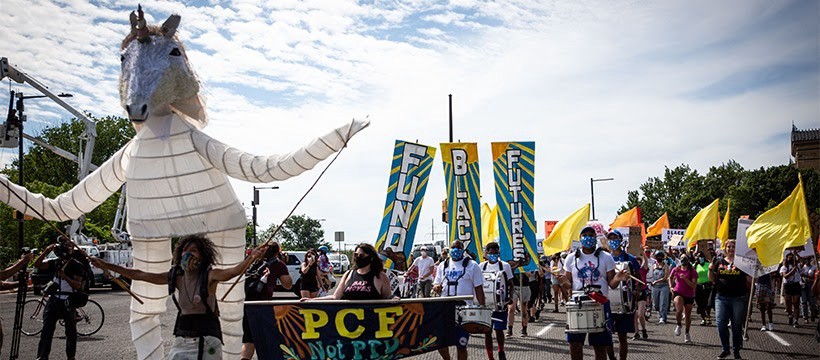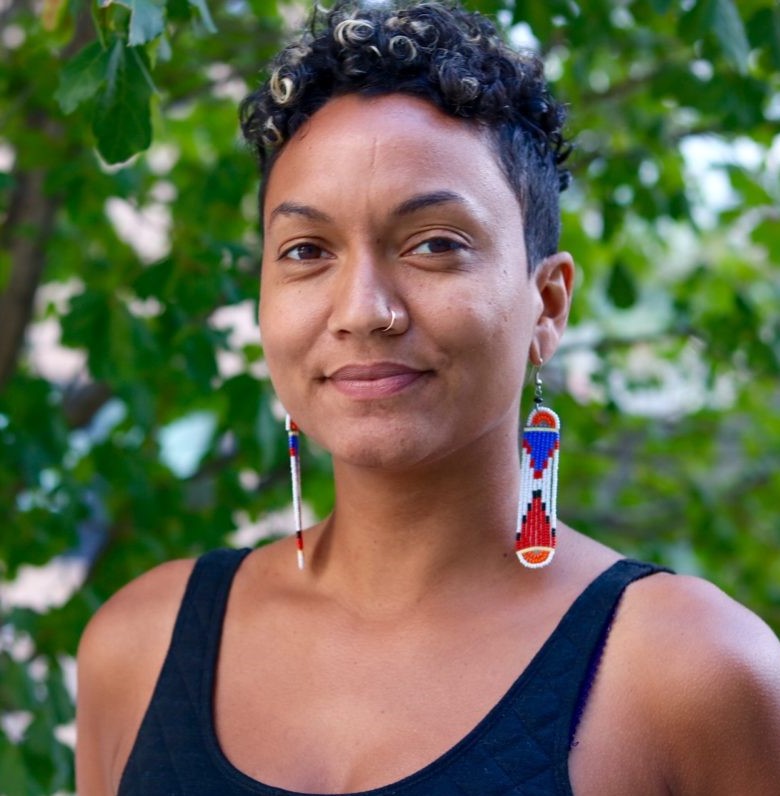Reposted with permission from the author.
Spiral Q | Image photo by Rachael Warriner
By Nuala Cabral
As anti-racist protests sweep across the country in the middle of a pandemic that has exposed structural inequalities, creators and storytellers have been watching, listening and creating. They are reflecting and envisioning, uncovering truth, and fostering healing. Arundhati Roy speaks to this in her recent article The pandemic is a portal, where she offers some insight and a valuable call to action. Instead of feeling despair that the world will never be the same, Roy urges us to take a hard look at the suffering caused by systemic oppression and reimagine and create a new normal that is better for the world, one where equality and justice are the norm.
Both media and philanthropy play important roles in supporting movements that challenge oppressive systems, and should do so without co-opting or containing them. As Program Officer at Independence Public Media Foundation (IPMF), which supports community media in the Philly region, I’ve been reflecting on what it means for a philanthropic institution to respond to this moment with a sense of urgency, trust of community and commitment.
In our recent grant cycle, the Community Voices Fund, we sought out projects and organizations that are reckoning with this moment while centering communities. Our priority was to support vulnerable communities who are often overlooked in mainstream national and local news and media outlets. We were particularly interested in supporting movement media, BIPOC-led organizations, collaborations, and organizations with budgets under $1 million.
Addressing COVID and Systemic Racism
Many of the CV grantees are creating storytelling projects that document COVID’s impact and/or address structural inequality, particularly systemic racism. The Heaux History Project does both, by exploring stories of sex workers of color in Philadelphia as they navigate COVID-19. This project, which is led by sex workers, will touch on various issues, from housing and job insecurity to policing and harm reduction. Through interviews and storytelling, the project will address questions like: How did existing structural inequalities further impact their lives during this time? How did changing policies regarding policing, loitering ordinances, displacement of encampments, and the shutdown of harm reduction services impact their daily lives, during and after lockdown? These are perspectives that are missing from national and local news outlets. Our hope is that over time these projects will become more visible and sustainable, and that local media outlets will be more inclusive and representative of our diverse community.
Preserving Memory and Reimagining the Future
The Fund also supported many archive projects that preserve memory, or explore the imagined future, of neighborhoods and communities. Many of these projects directly respond to COVID and some do not. For example, the Village of Art and Humanities’ Report from the Future will convene artists, designers, and community members in North Philly to ask, “What does a Philadelphia look like that’s designed for me?” Facilitated and curated by an Afrofuturist-in-Residence at The Village, the workshops will result in multimedia responses that serve as reference points for policymakers and stakeholders.
As someone who often thinks about roots and wings, ancestors and the importance of imagining new (and more just) systems, I am excited about these projects. Many of them are pushing boundaries, like the multimedia project at House of Lux and the Colored Girls Museum’s exploration with immersive technology and 3D video. These organizations are creating memorial sites that honor both local and national black history in a moment of robust public discourse around monuments and memory. The archives they are gathering are often absent in history books — including the ordinary stories and oral histories that help explain how we’ve arrived at this current moment.
Collaboration Over Competition
As a foundation, we want to support network building and collaboration, so we were pleased to identify several grantees that are pursuing collaborative projects with other organizations. Several of the grantees are collaborative projects that seek to engage community, foster dialogue and expand access to news and information. The African Immigrant Storytelling Project, Youth Set the Stage, the Information Networks Collaboration and Spiral Q are just a few examples.
Some projects were inherently collaborative even though the proposal came from one organization. This is the case for Spiral Q, which seeks to build a stronger network of activists, neighborhood groups and organizations, educators, artists and individuals while using the arts, storytelling and performance to support social justice movements. You may have seen their giant unicorn and banners at recent protests this summer. Projects like theirs bring beauty, creativity and joy to movements, helping to make them irresistible.
Youth Set the Stage is an opportunity for several youth organizations to come together in the spirit of collaboration, instead of competition. Youth across these various organizations will be creating and curating content and holding space for youth to explore issues like COVID’s impact, mental health and the upcoming election. As someone who has worked in the youth media field for the past decade and began creating media as a teenager, I understand the value and importance of youth media makers being able to publicly present their work. For me, it was that public engagement that gave me the confidence to take my hobby more seriously. But for young filmmakers, there are few opportunities for public engagement beyond a particular school or organization, especially during the pandemic. I hope this project, though virtual, allows youth to fully express themselves, inspire each other, learn together and be affirmed.
The Role of Media and Philanthropy
I see IPMF’s legacy as amplifying community voices and supporting movement media beyond this particular grant cycle and historic moment because ultimately we want communities to be seen and heard and to thrive in the long-term. To this end, our team at IPMF is eager to partner with other philanthropic institutions and pool dollars, leverage networks, and other resources to invest in media making efforts and real change. We want to continue to broaden our sphere, reaching folks who are disconnected from media technology or erased and flattened in news and popular media.
Someday we will look back on the creative efforts, stories and expressions created during this time, and they will help us make sense of the world around us, how we managed to come together, pull through and usher in a new normal that we so desperately need.
Nuala Cabral is Program Officer at Independence Public Media Foundation and an award-winning filmmaker, cultural producer, and teaching artist who is deeply committed to the power of storytelling and media to build bridges of understanding and advance social justice.


